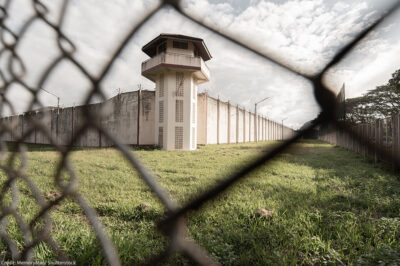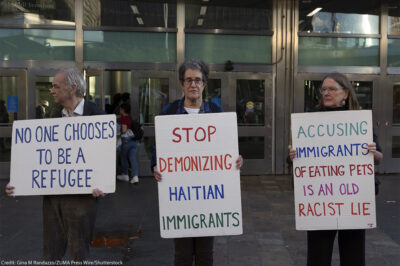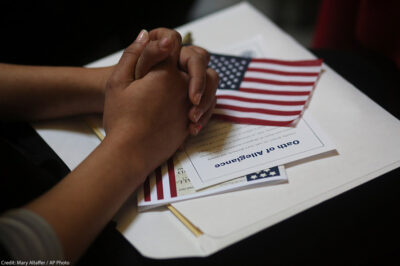"Occupy for Human Rights": The U.S. Government Should Protect the Human Rights of All People
December 10th is Human Rights Day, a day when people and governments around the world will celebrate the 63rd anniversary of the Universal Declaration of Human Rights and recommit to protecting and promoting human rights.
This day and the rest of the month also mark the end of the International Year for People of African Descent, an occasion proclaimed by the international community to recognize that “people of African descent represent a distinct group whose human rights must be promoted and protected”. Events being organized today in the United States and all over the world give us the opportunity to call attention to racial discrimination and the ongoing challenge in “bringing human rights home”.
Despite the real progress that has been made in the United States towards eliminating the legacy of Jim Crow, as the ACLU and other civil rights/human rights organizations have documented, racial and ethnic minorities — and especially peoples of African descent (ie. Black Americans) — “continue to face intentional, structural, and de facto forms of discrimination which manifest in unequal access to quality education, housing, health services, and employment, as well as electoral disfranchisement and discrimination in the criminal justice system.” For example, recent U.S. Census Bureau statistics show that 36 percent of Black children are living in poverty, the highest rates of any racial group (by comparison, 33 percent of Hispanic children and 12 percent of white children are living in poverty).
So how do we assess the Obama administration’s progress in protecting and promoting the human rights of people of African descent?
One measure of evaluation is examining the U.S. government’s compliance in implementing its legal obligations under international human rights treaties. The United States Constitution requires our government to treat ratified treaties as the “supreme Law of the Land” and as a party to the International Convention on the Elimination of All Forms of Racial Discrimination (ICERD)— the most comprehensive anti-discrimination legal instrument in the world— the United States government is legally bound to fight racism and “take effective measures to review governmental, national and local policies, and to amend, rescind or nullify any laws and regulations which have the effect of creating or perpetuating racial discrimination wherever it exists.”
In the past few years, the United Nations Committee on the Elimination of Racial Discrimination (the committee that assesses adherence to ICERD) and other U.N. human rights experts have provided specific and detailed recommendations advising the U.S. government to implement human rights obligations domestically in order to address systemic forms of racism and discrimination.
While there has been real progress in enforcing some anti-discrimination laws in recent years due to the important work of the U.S. Justice Department's Civil Rights Division, much more needs to be done in order to bring U.S. laws and policies in line with international human rights norms.
So what are some simple steps that the Obama administration could take to better protect the human rights of all people, including people of African descent?
One way the Obama administration can show leadership is by taking concrete measures to fully implement the ICERD and creating a special task force to develop a plan of action to implement ICERD at all government levels.
A second step that the Obama administration can take is to issue an Executive Order to fully implement U.S. treaty obligations and create an accountable and transparent mechanism to integrate international human rights into domestic policy. By taking this action, the administration would ensure the effective implementation and follow-up on recommendations made by U.N. human rights bodies and demonstrate its commitment to protecting and promoting human rights both at home and abroad.
As an architect of the Universal Declaration of Human Rights, Eleanor Roosevelt famously stated, "Where, after all, do universal human rights begin? In small places, close to home — so close and so small that they cannot be seen on any maps of the world. Yet they are the world of the individual person; the neighborhood he lives in; the school or college he attends; the factory, farm, or office where he works. Such are the places where every man, woman, and child seeks equal justice, equal opportunity, equal dignity without discrimination. Unless these rights have meaning there, they have little meaning anywhere. Without concerted citizen action to uphold them close to home, we shall look in vain for progress in the larger world."
In a recent statement, the United States government claimed to be “profoundly committed to ending racism and racial discrimination. We remain fully and firmly committed to upholding the human rights of all people and to combating racial discrimination, xenophobia, intolerance, anti-Semitism and bigotry, including through enhanced implementation of the International Convention on the Elimination of All Forms of Racial Discrimination.”
The Occupy Wall Street movement has shown the world that concerned citizens are rising up to demand dignity, respect, and basic rights. While these popular protests and growing efforts are crucially important in building a domestic movement for justice and equality, it is time for our government to do more to protect equality and opportunity for all. Now is the time for our government to match its noble rhetoric with tangible action by creating a national plan of action for ICERD implementation and by demonstrating a renewed commitment to implementing human rights domestically.
Learn more about human rights: Sign up for breaking news alerts, follow us on Twitter, and like us on Facebook.




